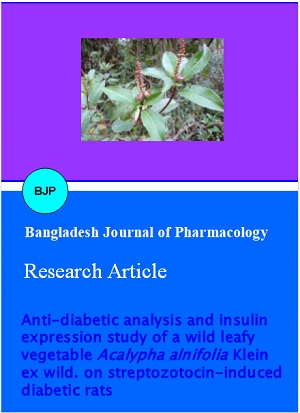Anti-diabetic analysis and insulin expression study of a wild leafy vegetable Acalypha alnifolia Klein ex wild. on streptozotocin-induced diabetic rats
DOI:
https://doi.org/10.3329/bjp.v10i2.21931Keywords:
Hypoglycemia, Hypolipidemia, Insulin expressionAbstract
Assessing the antidiabetic potential of Acalypha alnifolia is the main objective of the present study. Two doses of leaf extracts were treated with streptozotocin-induced diabetic rats for 21 days. The glucose level, insulin level, plasma lipids, total protein, electrolytes and plasma enzymes were monitored. The acetone extract of 400 mg/kg had potentiated to diminish the glucose and lipid level as well as other diabetic complications. Internal structures of pancreas were studied by histopathological sections and insulin expression was also observed by immunohistochemical study. Though the extracts having good antioxidant capability it might have to reduce the beta cell destruction or helps to repair it. The result of the toxicity analysis, histopathology and insulin expression supports the acetone extract. The present study attesting the antidiabetic properties of A. alnifolia hence this plant would be focused and taken for cultivation leads to add in human diet for getting therapeutic benefit.
Downloads
697
318 Read
164

Additional Files
Published
How to Cite
Issue
Section
License
Authors who publish with this journal agree to the following terms:
- Authors retain copyright and grant the journal right of first publication with the work simultaneously licensed under a Creative Commons Attribution License that allows others to share the work with an acknowledgement of the work's authorship and initial publication in this journal.
- Authors are able to enter into separate, additional contractual arrangements for the non-exclusive distribution of the journal's published version of the work (e.g., post it to an institutional repository or publish it in a book), with an acknowledgement of its initial publication in this journal.
- Authors are permitted and encouraged to post their work online (e.g., in institutional repositories or on their website) prior to and during the submission process, as it can lead to productive exchanges, as well as earlier and greater citation of published work (See The Effect of Open Access).
